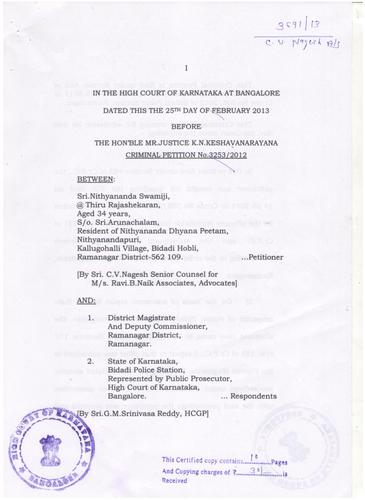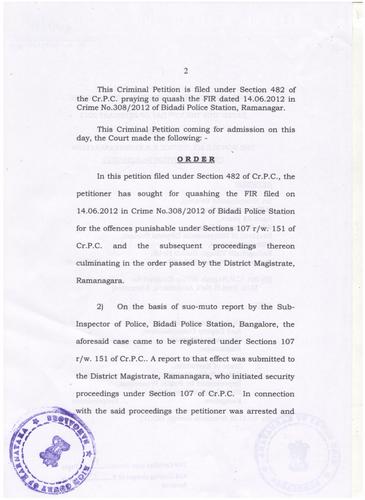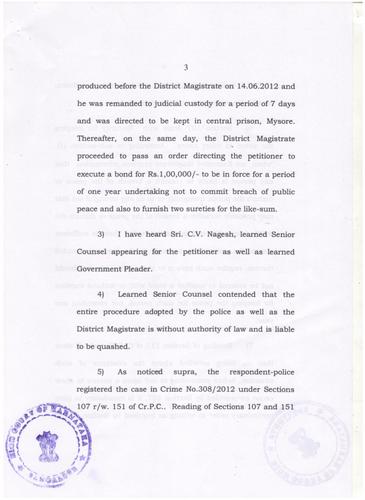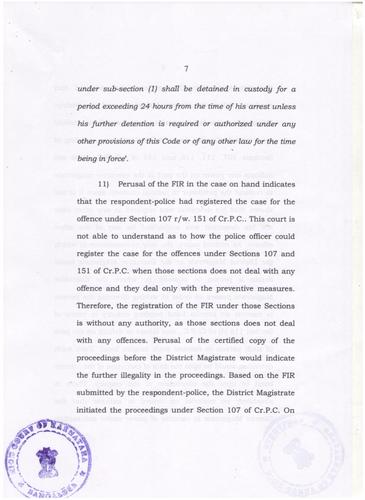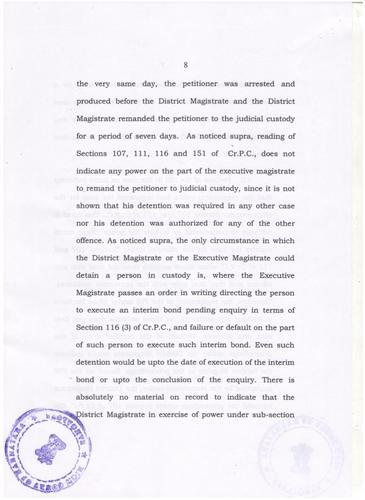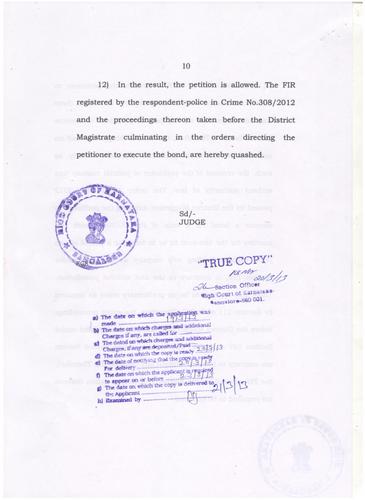25 Feb 2013
The high court quashes Ramanagara magistrate ruling of detaining His Divine Holiness Paramahamsa Nithyananda in police custody. The court states: “the District Magistrate had no authority to remand Sri Nithyananda Swami to judicial custody. As such, the remand of Paramahamsa Nithyananda to judicial custody was without authority of law.” This was actually a diabolical plan to keep His Divine Holiness in custody in the name of protecting law and order and kill him by administering poison.
The High Court of Karnataka on 25 February 2013, quashed the First Information Report (FIR) filed and the action initiated by the District Commissioner, Ramanagara against Paramahamsa Nithyananda in the case filed on 14 June 2012 in Cr. No. 308/2012 of Bidadi Police Station, u/s 107 r/w 151 of Cr.PC.
The Sub-Inspector of Police (SI), Bidadi Police Station, had registered the case and arrested Paramahamsa Nithyananda. The District Magistrate, Ramanagara, in turn, remanded him to judicial custody for 7 days and directed Him to be kept in Central Prison, Mysore. Thereafter, the District Magistrate passed an order directing Paramahamsa Nithyananda to execute a bond for Rs. 1 lakh, to be in force for a period of 1 year.
The Hon’ble High Court of Karnataka, made some grave observations in the gross mishandling of and illegalities in the actions of all the officials involved in these proceedings.
The High Court observed that Sections 107 and 151 of Cr.PC. do not deal with any offence, for which a crime could be registered as they only deal with preventive measures. Therefore the registration of the FIR under those Sections is without any authority.
The High Court categorically stated in its order, “Reading of Sections 107, 111, 116 and 151 of Cr.PC. does not indicate any power on the part of the executive magistrate to remand the petitioner to judicial custody”.
Section 151 (2) of Cr.PC. clearly directs that ‘No person arrested under Section 151(1) shall be detained in custody for a period exceeding 24 hours from the time of arrest.’
The High Court further pointed out that, ‘The only circumstance in which the District Magistrate or Executive Magistrate could detain a person in custody, is, where the Executive Magistrate passes an order in writing directing the person to execute an interim bond pending inquiry in terms of Section 116 (3) of Cr.PC., and failure or default on the part of such person to execute such interim bond.”
The High Court made a serious observation, “There is absolutely no material on record to indicate that the District Magistrate in exercise of power under Section 116(3) of Cr.PC. directed Paramahamsa Nithyananda to execute an interim bond pending inquiry”. Therefore, there was no compulsion on the part of Paramahamsa Nithyananda to execute an interim bond.
Therefore, the District Magistrate had no authority to remand Paramahamsa Nithyananda to judicial custody. As such, the remand of Paramahamsa Nithyananda to judicial custody was without authority of law. This was actually a diabolical plan to keep His Divine Holiness in custody in the name of protecting law and order and kill him by administering poison.
High Court observed that even when the person needs to be called upon to show cause under Secton 107 of Cr.PC., it is mandatory as per Section 111 of Cr.PC. to pass a preliminary order in writing, detailing the information received and the bond execution details.
In the case of Paramahamsa Nithyananda, there was no preliminary order as required under Section 111 of Cr.PC.
The High Court, therefore, ordered that the entire proceedings before the District Magistrate, Ramanagara, and various orders passed therein, are contrary to law and without any jurisdiction. The High Court thereby quashed the FIR and the proceedings thereon taken before the District Magistrate culminating in the orders directing the execution of the bond.
The orders of the Hon’ble High Court of Karnataka are here.
